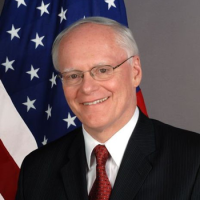RED LINE | The Unraveling of Syria and America's Race to Destroy the Most Dangerous Arsenal in the World
In August 2013, a massive sarin attack in the Damascus suburbs shocked the world and confronted the Obama White House with an agonizing choice: Whether to enforce the president’s “red line” threat with a military strike, or gamble on a diplomatic solution that offered the appealing prospect of the complete elimination of Syria’s strategic chemical weapons stockpile. Ultimately a deal was struck, and within days the race was on to extract and destroy hundreds of tons of lethal chemicals stashed in military bunkers across Syria, in the middle of a civil war.
In his new book Red Line, journalist and author Joby Warrick draws from new documents and hundreds of interviews to reconstruct the key decision points as well as the unprecedented international effort to remove the weapons under fire and then—when no country was willing to accept Syria’s chemicals—to destroy them at sea.
Warrick argues that, despite cheating by Syria—and in spite of the larger failure to end Syria’s mammoth humanitarian crisis—the disarmament mission was an important multilateral success. The historic undertaking deprived Assad of the bulk of his nerve agents and production equipment, and prevented what might have been a catastrophic leakage of deadly nerve agents to Syrian combatants and terrorist groups.
Selected Quotes
Joby Warrick
"If we hadn't been so intent on targeting these facilities and denying ISIS of its caliphate, they would have succeeded. They managed to make mustard gas -- it wasn't very good, but they made it and they used it in battle and they had bigger ideas. There's no question that this is now part of their potential playbook. They have the resources, they know how to do it, so it's a problem that's with us now even after the caliphate's gone away."
James Jeffrey
"We're still in the game as an international community; demanding somehow, someway Assad and his henchmen have to pay and have to change or they're not going to be accepted back into the international community."
"We couldn't get to it in the Trump administration. Part of it was we had only so many months left by the time we really had convinced the Russians they were in a military stalemate and the Assad regime may have "won" in the sense of not losing, but they were not left with any kind of viable country. That is an opening for the next administration; they have four years -- minus a few weeks at this point -- to convince the Russians that whatever they commit to will be US, and likely Western policy, for the next four years."
Robert S. Litwak
"Certainly the Islamic State and Al Qaeda aspire to acquire these mass casualty capabilities and there's no political or moral constraint on them. The constraints are practical and technical."
Related Publication
Speaker

Former ambassador to Iraq and Turkey, and Special Envoy to the Global Coalition To Defeat ISIS
Introduction

Keynote Speaker

National Security Correspondent for The Washington Post
Moderator

Hosted By

Middle East Program
The Wilson Center’s Middle East Program serves as a crucial resource for the policymaking community and beyond, providing analyses and research that helps inform US foreign policymaking, stimulates public debate, and expands knowledge about issues in the wider Middle East and North Africa (MENA) region. Read more

